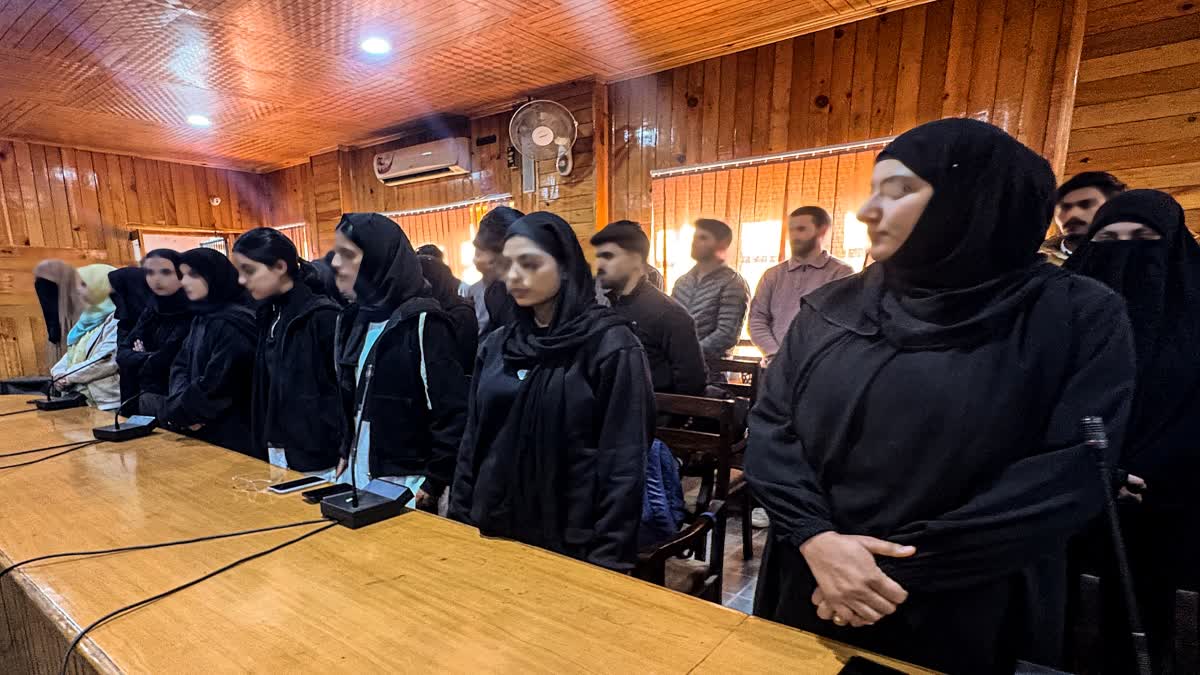Vande Mataram Row in Kashmir Schools: Omar Abdullah Denies Authorizing Celebrations, Calls It ‘Outside Dictation’
By: Javid Amin | November 7, 2025
Jammu and Kashmir Chief Minister Omar Abdullah has publicly distanced his administration from the controversial decision mandating Vande Mataram celebrations across schools in the Union Territory. He clarified that the directive did not originate from his government, terming it “outside dictation” and warning against interference in internal governance.
Background: The Directive That Sparked the Storm
Earlier this week, the Department of Culture issued a circular instructing all educational institutions in Jammu and Kashmir to mark the 150th anniversary of Vande Mataram with cultural and musical programmes.
The order specifically called for mass recitations and performances of the national song in schools, colleges, and government offices.
However, the directive triggered immediate outrage in the Valley, where religious groups and several political parties questioned the intent behind imposing a uniform cultural programme in a Muslim-majority region.
Omar Abdullah’s Clarification
Addressing reporters in Srinagar, Omar Abdullah made it clear that his Cabinet was neither consulted nor informed before the circular was issued.
“This decision has not been made by the Cabinet, nor has the Education Minister signed off on it,” Abdullah said.
“We should decide what happens in our schools without outside dictation on these matters. There should be no interference in our work.”
Abdullah hinted that bureaucratic overreach or external pressure may have played a role in the decision, saying his administration would review how the order was issued without Cabinet sanction.
Religious and Civil Society Reaction
The directive quickly drew condemnation from religious bodies, led by the Mutahida Majlis-e-Ulema (MMU)—a conglomerate of leading Islamic scholars and imams in Kashmir.
The MMU described the order as “un-Islamic” and “insensitive to religious diversity,” urging the government to withdraw it immediately.
It argued that participation in such programmes should be voluntary, not compulsory, especially in matters carrying religious or ideological undertones.
Student associations in Srinagar and Budgam also expressed discomfort, saying the focus of schools should remain on academics rather than politically charged commemorations.
Government vs. Lieutenant Governor’s Office
While the Omar Abdullah-led elected government sought to calm tensions, Lieutenant Governor Manoj Sinha went ahead with the main Vande Mataram event in Jammu, attending alongside senior bureaucrats and police officials.
The contrasting postures of the elected government and the Raj Bhavan have exposed renewed friction between civilian and central authorities in the Union Territory’s hybrid administrative setup.
Political observers note that this episode highlights continuing dual-power tensions—where symbolic cultural directives often originate from central agencies rather than the local government.
Political Fallout and Party Reactions
-
National Conference (NC) leaders rallied behind Omar Abdullah’s clarification, framing the issue as one of administrative autonomy and respect for federal boundaries.
-
PDP spokespersons said the incident demonstrated that “real power still lies outside J&K’s elected institutions.”
-
The BJP’s J&K unit, however, defended the directive, insisting that “Vande Mataram is above politics” and that “celebrating national symbols unites the nation.”
The bypoll campaigns in Budgam and Nagrota, scheduled for November 11, have already begun reflecting the controversy. BJP leaders in Jammu have framed Omar’s remarks as “appeasement politics,” while NC and PDP cadres in the Valley see them as a stand for regional dignity.
Cultural Symbolism and the Kashmir Context
In Kashmir, Vande Mataram has long carried complex connotations—viewed nationally as a song of freedom and pride, but regionally as a marker of New Delhi’s cultural influence in a politically sensitive region.
Since the abrogation of Article 370 in 2019, a series of centrally sponsored cultural and educational initiatives—ranging from Har Ghar Tiranga to Meri Maa Bharat campaigns—have stirred periodic controversy over religious and cultural inclusivity.
Sociologists say that while the intent may be to promote unity, the method of enforcement often fuels alienation. “Symbolism without consultation is counterproductive,” noted political analyst Dr Fayaz Ahmad Baba, adding that “Kashmir’s diversity must be engaged through dialogue, not directives.”
What Happens Next
Omar Abdullah has indicated that the government will seek a review of the Culture Department’s actions and reaffirm that educational and cultural decisions must flow through the Cabinet.
Meanwhile, schools across the Valley are treading cautiously—many have opted for generic “cultural day” observances instead of explicit Vande Mataram recitations to avoid controversy.
Legal experts suggest the episode could prompt a broader debate over administrative jurisdiction between J&K’s elected government and the Union’s appointed administration, especially in education and cultural policy.
Wider Implications
The controversy may influence upcoming local elections and redefine the political messaging of Valley-based parties.
It underscores a larger question that continues to shape Jammu & Kashmir’s politics:
Who decides the cultural and ideological tone of public life in the region—the people’s representatives or bureaucrats acting under central direction?
Summary Insight
-
Trigger: Department of Culture’s circular mandating Vande Mataram celebrations.
-
CM’s Response: Omar Abdullah denied authorization, calling it “outside dictation.”
-
Religious Reaction: MMU termed the order un-Islamic, urged withdrawal.
-
Political Fallout: Renewed friction between elected govt and LG office; polarization across party lines.
-
Core Issue: Cultural imposition vs. administrative autonomy in post-Article 370 Kashmir.



